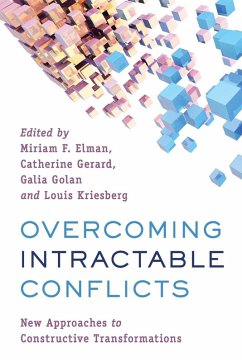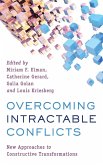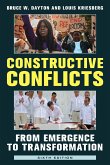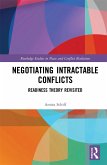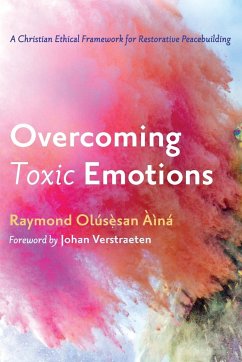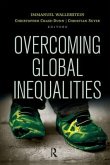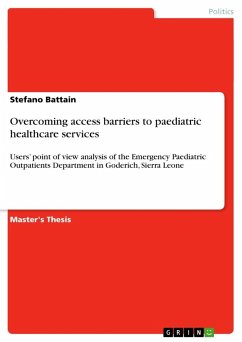Overcoming Intractable Conflicts
New Approaches to Constructive Transformations
Herausgeber: Elman, Miriam F.; Golan, Galia; Gerard, Catherine
Overcoming Intractable Conflicts
New Approaches to Constructive Transformations
Herausgeber: Elman, Miriam F.; Golan, Galia; Gerard, Catherine
- Broschiertes Buch
- Merkliste
- Auf die Merkliste
- Bewerten Bewerten
- Teilen
- Produkt teilen
- Produkterinnerung
- Produkterinnerung
The book brings together analyses of U.S.-based conflicts with those from many regions of the world. International, intra-state, and local conflicts are explored, along with those that have been violent and non-violent.
Andere Kunden interessierten sich auch für
![Overcoming Intractable Conflicts Overcoming Intractable Conflicts]() Overcoming Intractable Conflicts171,99 €
Overcoming Intractable Conflicts171,99 €![Constructive Conflicts Constructive Conflicts]() Bruce W. DaytonConstructive Conflicts70,99 €
Bruce W. DaytonConstructive Conflicts70,99 €![Intractable Conflicts and Back-Track Mediation Intractable Conflicts and Back-Track Mediation]() Mehmet DenizIntractable Conflicts and Back-Track Mediation97,99 €
Mehmet DenizIntractable Conflicts and Back-Track Mediation97,99 €![Negotiating Intractable Conflicts Negotiating Intractable Conflicts]() Amira SchiffNegotiating Intractable Conflicts195,99 €
Amira SchiffNegotiating Intractable Conflicts195,99 €![Overcoming Toxic Emotions Overcoming Toxic Emotions]() Raymond Olusesan AinaOvercoming Toxic Emotions34,99 €
Raymond Olusesan AinaOvercoming Toxic Emotions34,99 €![Overcoming Global Inequalities Overcoming Global Inequalities]() Immanuel WallersteinOvercoming Global Inequalities302,99 €
Immanuel WallersteinOvercoming Global Inequalities302,99 €![Overcoming access barriers to paediatric healthcare services Overcoming access barriers to paediatric healthcare services]() Stefano BattainOvercoming access barriers to paediatric healthcare services27,95 €
Stefano BattainOvercoming access barriers to paediatric healthcare services27,95 €-
-
-
The book brings together analyses of U.S.-based conflicts with those from many regions of the world. International, intra-state, and local conflicts are explored, along with those that have been violent and non-violent.
Hinweis: Dieser Artikel kann nur an eine deutsche Lieferadresse ausgeliefert werden.
Hinweis: Dieser Artikel kann nur an eine deutsche Lieferadresse ausgeliefert werden.
Produktdetails
- Produktdetails
- Verlag: Rowman & Littlefield Publishers
- Seitenzahl: 426
- Erscheinungstermin: 24. September 2019
- Englisch
- Abmessung: 229mm x 152mm x 25mm
- Gewicht: 688g
- ISBN-13: 9781786610737
- ISBN-10: 1786610736
- Artikelnr.: 56971300
- Herstellerkennzeichnung
- Libri GmbH
- Europaallee 1
- 36244 Bad Hersfeld
- gpsr@libri.de
- Verlag: Rowman & Littlefield Publishers
- Seitenzahl: 426
- Erscheinungstermin: 24. September 2019
- Englisch
- Abmessung: 229mm x 152mm x 25mm
- Gewicht: 688g
- ISBN-13: 9781786610737
- ISBN-10: 1786610736
- Artikelnr.: 56971300
- Herstellerkennzeichnung
- Libri GmbH
- Europaallee 1
- 36244 Bad Hersfeld
- gpsr@libri.de
Edited by Miriam F. Elman; Catherine Gerard; Galia Golan and Louis Kriesberg
Introduction Galia Golan
Hebrew University of Jerusalem; Louis Kriesberg
Syracuse University Chapter 2: Gendered Perspective on Intractable Conflicts and Power Sharing Ayelet Harel-Shalev
Ben-Gurion University of the Negev Chapter 3: Mapping and Monitoring Global Insecurity and the Global Illicit Economy: The Effects of Intractable Conflicts Margaret Hermann
Syracuse University Chapter 4: Unrecognized States: Theory
Cases
and Policy Implications Kristy Buzard
Syracuse University; Benjamin A.T. Graham
University of Southern California; Ben Horne Chapter 5: Transformation of Armed Conflict: Lessons from the Arab-Israeli Conflict Galia Golan
Hebrew University of Jerusalem Chapter 6: Dynamics Contexts of Conflict: Complicated Actors and Settings in Northern Ireland Ronit Berger
Interdisciplinary Center (IDC)
Herzliya
Israel Chapter 7: Social Media Use and Fear Levels after the Paris 2015 Attacks: A Comparative Study Bernard Enjolras
Institute for Social Research in Oslo
Norway; Shana Kushner Gadarian
Syracuse University; Kari Steen-Johnsen
Institute for Social Research in Oslo
Norway Chapter 8: The Creation of Space for Conflict Change: Context
Society and Leadership in Northern Ireland during the 1990s Nimrod Rosler
Tel Aviv University Chapter 9: Between Ripeness and Necessity: Responsibility to Protect (R2P) and the Tipping Point for External Intervention Timea Spitka
Hebrew University Chapter 10: Global Imbalances
Currency Wars
and U.S. Hegemony Stuart Brown
Syracuse University Chapter 11: Responding to Gun Murders in Syracuse
NY: A Multilevel
Multimodal Interventions Approach Robert Rubinstein
Syracuse University; Sandra D. Lane
Syracuse University; Timothy "Noble" Jennings-Bey
Street Addiction Institute
Inc.
Syracuse
NY; Najah Salaam Chapter 12: Intergroup Dialogue
Constructive Conflict and Social Power: Towards Transforming Inequality Diane Swords
Intergroup Dialogue Program
Syracuse University Chapter 13: Transforming Conflicts: Barriers and Overcoming Them Daniel Bar-Tal
Tel Aviv University Chapter 14: Back to the Tribes: Tribes' Centrality in Iraq's Inter-community Rapprochement Amatzia Baram
University of Haifa Chapter 15: U.S. and North Korea: A Gordian Conflict Stuart Thorson
Syracuse University; Hyunjin Seo
University of Kansas Chapter 16: Transit Migration
Borders
and Activism: Understanding the Changing Geographies and Temporalities of International Migration Jared Van Ramshorst and Jamie Winders
Syracuse University Chapter 17: Transforming Intractable Conflicts under the Shadow of the Past: The Sunk Cost and Inaction Inertia Effects Lesley Terris
Lauder School of Government
Policy and Diplomacy of the Interdisciplinary Center; Orit E. Tykocinski
Baruch Ivcher School of Psychology
Interdisciplinary Center (IDC) Chapter 18: Velvet Transformation in South Africa: Mandela
De Klerk
or Something Else Mordechai Tamarkin
Tel Aviv University Chapter 19: The Fractal Nature of Intractable Conflict: Implications for Sustainable Transformation Joshua Fisher and Peter T. Coleman
Columbia University Chapter 20: From Peacebuilding to Constructive Conflict Management: Reconsidering Intervention under Conditions of Intractability Bruce W. Dayton
SIT Graduate Institute
School for International Training Conclusion: Looking Forward Catherine Gerard
Syracuse University and Miriam Elman
Syracuse University
Hebrew University of Jerusalem; Louis Kriesberg
Syracuse University Chapter 2: Gendered Perspective on Intractable Conflicts and Power Sharing Ayelet Harel-Shalev
Ben-Gurion University of the Negev Chapter 3: Mapping and Monitoring Global Insecurity and the Global Illicit Economy: The Effects of Intractable Conflicts Margaret Hermann
Syracuse University Chapter 4: Unrecognized States: Theory
Cases
and Policy Implications Kristy Buzard
Syracuse University; Benjamin A.T. Graham
University of Southern California; Ben Horne Chapter 5: Transformation of Armed Conflict: Lessons from the Arab-Israeli Conflict Galia Golan
Hebrew University of Jerusalem Chapter 6: Dynamics Contexts of Conflict: Complicated Actors and Settings in Northern Ireland Ronit Berger
Interdisciplinary Center (IDC)
Herzliya
Israel Chapter 7: Social Media Use and Fear Levels after the Paris 2015 Attacks: A Comparative Study Bernard Enjolras
Institute for Social Research in Oslo
Norway; Shana Kushner Gadarian
Syracuse University; Kari Steen-Johnsen
Institute for Social Research in Oslo
Norway Chapter 8: The Creation of Space for Conflict Change: Context
Society and Leadership in Northern Ireland during the 1990s Nimrod Rosler
Tel Aviv University Chapter 9: Between Ripeness and Necessity: Responsibility to Protect (R2P) and the Tipping Point for External Intervention Timea Spitka
Hebrew University Chapter 10: Global Imbalances
Currency Wars
and U.S. Hegemony Stuart Brown
Syracuse University Chapter 11: Responding to Gun Murders in Syracuse
NY: A Multilevel
Multimodal Interventions Approach Robert Rubinstein
Syracuse University; Sandra D. Lane
Syracuse University; Timothy "Noble" Jennings-Bey
Street Addiction Institute
Inc.
Syracuse
NY; Najah Salaam Chapter 12: Intergroup Dialogue
Constructive Conflict and Social Power: Towards Transforming Inequality Diane Swords
Intergroup Dialogue Program
Syracuse University Chapter 13: Transforming Conflicts: Barriers and Overcoming Them Daniel Bar-Tal
Tel Aviv University Chapter 14: Back to the Tribes: Tribes' Centrality in Iraq's Inter-community Rapprochement Amatzia Baram
University of Haifa Chapter 15: U.S. and North Korea: A Gordian Conflict Stuart Thorson
Syracuse University; Hyunjin Seo
University of Kansas Chapter 16: Transit Migration
Borders
and Activism: Understanding the Changing Geographies and Temporalities of International Migration Jared Van Ramshorst and Jamie Winders
Syracuse University Chapter 17: Transforming Intractable Conflicts under the Shadow of the Past: The Sunk Cost and Inaction Inertia Effects Lesley Terris
Lauder School of Government
Policy and Diplomacy of the Interdisciplinary Center; Orit E. Tykocinski
Baruch Ivcher School of Psychology
Interdisciplinary Center (IDC) Chapter 18: Velvet Transformation in South Africa: Mandela
De Klerk
or Something Else Mordechai Tamarkin
Tel Aviv University Chapter 19: The Fractal Nature of Intractable Conflict: Implications for Sustainable Transformation Joshua Fisher and Peter T. Coleman
Columbia University Chapter 20: From Peacebuilding to Constructive Conflict Management: Reconsidering Intervention under Conditions of Intractability Bruce W. Dayton
SIT Graduate Institute
School for International Training Conclusion: Looking Forward Catherine Gerard
Syracuse University and Miriam Elman
Syracuse University
Introduction Galia Golan
Hebrew University of Jerusalem; Louis Kriesberg
Syracuse University Chapter 2: Gendered Perspective on Intractable Conflicts and Power Sharing Ayelet Harel-Shalev
Ben-Gurion University of the Negev Chapter 3: Mapping and Monitoring Global Insecurity and the Global Illicit Economy: The Effects of Intractable Conflicts Margaret Hermann
Syracuse University Chapter 4: Unrecognized States: Theory
Cases
and Policy Implications Kristy Buzard
Syracuse University; Benjamin A.T. Graham
University of Southern California; Ben Horne Chapter 5: Transformation of Armed Conflict: Lessons from the Arab-Israeli Conflict Galia Golan
Hebrew University of Jerusalem Chapter 6: Dynamics Contexts of Conflict: Complicated Actors and Settings in Northern Ireland Ronit Berger
Interdisciplinary Center (IDC)
Herzliya
Israel Chapter 7: Social Media Use and Fear Levels after the Paris 2015 Attacks: A Comparative Study Bernard Enjolras
Institute for Social Research in Oslo
Norway; Shana Kushner Gadarian
Syracuse University; Kari Steen-Johnsen
Institute for Social Research in Oslo
Norway Chapter 8: The Creation of Space for Conflict Change: Context
Society and Leadership in Northern Ireland during the 1990s Nimrod Rosler
Tel Aviv University Chapter 9: Between Ripeness and Necessity: Responsibility to Protect (R2P) and the Tipping Point for External Intervention Timea Spitka
Hebrew University Chapter 10: Global Imbalances
Currency Wars
and U.S. Hegemony Stuart Brown
Syracuse University Chapter 11: Responding to Gun Murders in Syracuse
NY: A Multilevel
Multimodal Interventions Approach Robert Rubinstein
Syracuse University; Sandra D. Lane
Syracuse University; Timothy "Noble" Jennings-Bey
Street Addiction Institute
Inc.
Syracuse
NY; Najah Salaam Chapter 12: Intergroup Dialogue
Constructive Conflict and Social Power: Towards Transforming Inequality Diane Swords
Intergroup Dialogue Program
Syracuse University Chapter 13: Transforming Conflicts: Barriers and Overcoming Them Daniel Bar-Tal
Tel Aviv University Chapter 14: Back to the Tribes: Tribes' Centrality in Iraq's Inter-community Rapprochement Amatzia Baram
University of Haifa Chapter 15: U.S. and North Korea: A Gordian Conflict Stuart Thorson
Syracuse University; Hyunjin Seo
University of Kansas Chapter 16: Transit Migration
Borders
and Activism: Understanding the Changing Geographies and Temporalities of International Migration Jared Van Ramshorst and Jamie Winders
Syracuse University Chapter 17: Transforming Intractable Conflicts under the Shadow of the Past: The Sunk Cost and Inaction Inertia Effects Lesley Terris
Lauder School of Government
Policy and Diplomacy of the Interdisciplinary Center; Orit E. Tykocinski
Baruch Ivcher School of Psychology
Interdisciplinary Center (IDC) Chapter 18: Velvet Transformation in South Africa: Mandela
De Klerk
or Something Else Mordechai Tamarkin
Tel Aviv University Chapter 19: The Fractal Nature of Intractable Conflict: Implications for Sustainable Transformation Joshua Fisher and Peter T. Coleman
Columbia University Chapter 20: From Peacebuilding to Constructive Conflict Management: Reconsidering Intervention under Conditions of Intractability Bruce W. Dayton
SIT Graduate Institute
School for International Training Conclusion: Looking Forward Catherine Gerard
Syracuse University and Miriam Elman
Syracuse University
Hebrew University of Jerusalem; Louis Kriesberg
Syracuse University Chapter 2: Gendered Perspective on Intractable Conflicts and Power Sharing Ayelet Harel-Shalev
Ben-Gurion University of the Negev Chapter 3: Mapping and Monitoring Global Insecurity and the Global Illicit Economy: The Effects of Intractable Conflicts Margaret Hermann
Syracuse University Chapter 4: Unrecognized States: Theory
Cases
and Policy Implications Kristy Buzard
Syracuse University; Benjamin A.T. Graham
University of Southern California; Ben Horne Chapter 5: Transformation of Armed Conflict: Lessons from the Arab-Israeli Conflict Galia Golan
Hebrew University of Jerusalem Chapter 6: Dynamics Contexts of Conflict: Complicated Actors and Settings in Northern Ireland Ronit Berger
Interdisciplinary Center (IDC)
Herzliya
Israel Chapter 7: Social Media Use and Fear Levels after the Paris 2015 Attacks: A Comparative Study Bernard Enjolras
Institute for Social Research in Oslo
Norway; Shana Kushner Gadarian
Syracuse University; Kari Steen-Johnsen
Institute for Social Research in Oslo
Norway Chapter 8: The Creation of Space for Conflict Change: Context
Society and Leadership in Northern Ireland during the 1990s Nimrod Rosler
Tel Aviv University Chapter 9: Between Ripeness and Necessity: Responsibility to Protect (R2P) and the Tipping Point for External Intervention Timea Spitka
Hebrew University Chapter 10: Global Imbalances
Currency Wars
and U.S. Hegemony Stuart Brown
Syracuse University Chapter 11: Responding to Gun Murders in Syracuse
NY: A Multilevel
Multimodal Interventions Approach Robert Rubinstein
Syracuse University; Sandra D. Lane
Syracuse University; Timothy "Noble" Jennings-Bey
Street Addiction Institute
Inc.
Syracuse
NY; Najah Salaam Chapter 12: Intergroup Dialogue
Constructive Conflict and Social Power: Towards Transforming Inequality Diane Swords
Intergroup Dialogue Program
Syracuse University Chapter 13: Transforming Conflicts: Barriers and Overcoming Them Daniel Bar-Tal
Tel Aviv University Chapter 14: Back to the Tribes: Tribes' Centrality in Iraq's Inter-community Rapprochement Amatzia Baram
University of Haifa Chapter 15: U.S. and North Korea: A Gordian Conflict Stuart Thorson
Syracuse University; Hyunjin Seo
University of Kansas Chapter 16: Transit Migration
Borders
and Activism: Understanding the Changing Geographies and Temporalities of International Migration Jared Van Ramshorst and Jamie Winders
Syracuse University Chapter 17: Transforming Intractable Conflicts under the Shadow of the Past: The Sunk Cost and Inaction Inertia Effects Lesley Terris
Lauder School of Government
Policy and Diplomacy of the Interdisciplinary Center; Orit E. Tykocinski
Baruch Ivcher School of Psychology
Interdisciplinary Center (IDC) Chapter 18: Velvet Transformation in South Africa: Mandela
De Klerk
or Something Else Mordechai Tamarkin
Tel Aviv University Chapter 19: The Fractal Nature of Intractable Conflict: Implications for Sustainable Transformation Joshua Fisher and Peter T. Coleman
Columbia University Chapter 20: From Peacebuilding to Constructive Conflict Management: Reconsidering Intervention under Conditions of Intractability Bruce W. Dayton
SIT Graduate Institute
School for International Training Conclusion: Looking Forward Catherine Gerard
Syracuse University and Miriam Elman
Syracuse University

